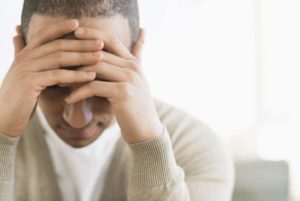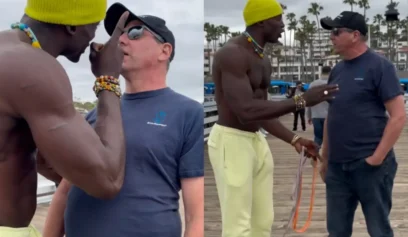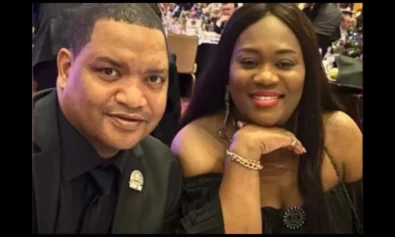
Nearly 23 percent of Black Men experience sexual violence other than rape during their lifetimes. (Photo by Tetra Images/Getty Images).
April marks the start of Sexual Assault Awareness Month, a time of year typically teeming with national campaigns highlighting the epidemics of rape and sexual abuse.
Some may hold silent protests in a show of support for female sexual assault victims, while others tow heavy mattresses across their college campuses to symbolize the psychological burden of sexual violence. Then, there’s that unique art display featuring Barbie and Batman underwear to serve as a chilling reminder that children bear the brunt of sexual assault too.
What’s often missing from the conversation, however, is the fact that adult men experience sexual violence as well. In the case of Black men, who have historically been painted as the perpetrators of said violence, the shame and trauma of being sexually exploited is enough to force many to suffer in silence.
Statistics from the National Sexual Violence Resource Center show that while 1 in 5 women will be raped in their lifetime, 1 in 19 men also will be raped at some point during their lives. Moreover, approximately 1 in 45 men have been forced to penetrate an intimate partner — both male and female — in their lifetime.
Nearly 21 percent of straight men, 40 percent of gay men and 47 percent of bisexual men also have experienced some form of sexual violence other than rape during their lifetimes, according to the NSVRC. Twenty-three percent of those men are Black. A 2015 study from the American Psychological Association also showed that African-American men are most likely to be sexually coerced through manipulation, compared to other racial/ethnic groups.
“There’s still a culture that believes that if someone is raped, somehow they asked for that rape,” said Monika Johnson Hostler, president of the National Alliance to End Sexual Violence. “We talk about this in terms of rape culture — and I think not talking about men, especially Black men, as victims plays into that culture that further pushes people to the margins of not reporting it, not seeking services.”
While sexual violence against women occurs much more often, instances of sexual violence experienced by Black men shouldn’t be overlooked. This is in no way an attempt to silence the voices of other suffering groups but only to spread much-needed awareness of the sexual abuse of African-American men.
In a deeply personal piece published early last year, University of Massachusetts student Josh Odam detailed his experience as a sexual assault survivor. Odam, a dual-degree candidate in political science and legal studies, said he initially opposed the idea of “story-sharing,” calling it yet another mechanism “designed to exploit Black suffering.” He recalled how members of the social justice collectives he was involved in were brave enough to share their pain when it came to assaults on their Blackness, whether it was at the hands of a lover or law enforcement.
The off-putting idea of sharing one’s story to work through personal trauma became all the more plausible after Odam himself became a victim of sexual violence.
“I was raped in the fall semester of 2015,” the UMass student wrote. “I was raped by a Black woman and it hurt me. It hurt me to know a Black woman — someone I rode for and with in this movement — hurt me in such a way. As a result, my grades slipped, I distanced myself from my community and convinced myself not to seek help because I did not want a white person capitalizing off my pain.”
Odam said his reluctance to seek help ultimately laid in the rigid beliefs he had surrounding Black masculinity.
“There were a number of things I said to convince myself that I had not been hurt,” he wrote. “‘These things do not happen to men, especially not Black men; You are a leader. You do not have time to waste on this white s–t; just move on and get back to work.”
Odam’s experience speaks to the larger issues of fragile Black masculinity and the increased risk of becoming a sexual assault victim while in college. According to the Rape, Abuse & Incest National Network, better known as RAINN, males ages 18 to 24 are approximately five times more likely than non-students of the same age to become a victim of rape or sexual assault. Moreover, the fear of being disbelieved or perceived as weak, gay or “less than a man,” especially in the Black community, further drives the denial of sexual abuse of boys and adult men.
Odam’s case also pokes a massive hole in the myth that sexual violators are always men. A 2010 analysis of Bureau of Justice Statistics (BJS) data revealed that 46 percent of male sexual assault victims reported female perpetrators.
This still begs the question of why the idea of Black males experiencing sexual violence is still taboo not only in the African-American community, but in society as a whole? Are people simply unaware that these things can and do happen?
“Unfortunately, the way that we do our anti-[sexual] violence awareness work is based on the demographics that do come forward, and of course our data does show that the most marginalized populations are most at risk of sexual assault,” Hostler said. “So, while men would be marginalized, more marginalized [are] women and young people.”
Hostler went on to suggest that the lack of discourse and awareness surrounding Black male sexual assault is largely due to the fact that awareness raising and prevention work are both based on prevalence data. She also pointed out that Black men, as well as survivors of other groups, must be willing to participate in studies collecting data on sexual assault, as hard as that may be.
“Therefore, its a missing voice and a void in the data that lead to speculating vs. having any data to support why there’s no focus and quite frankly what the problem looks like,” she explained.
Sexual violence can have devastating impacts on both male and female victims, causing long-term physical and psychological effects including increased risk of pregnancy, STDs, anxiety, depression, PTSD and even suicidal thoughts and/or actions. According to RAINN, people who have been sexually assaulted also are more likely to use drugs and often have strained relationships with family, friends and co-workers.
For Odam, the healing process begins with dialogue.
“The statistics scream out, but the silence is deafening,” he wrote. “I am not saying we have to speak about it in front of white people, but we have to speak about it. As Black men who have survived sexual assault, we cannot remain silent considering the violence being done to our children. They should not have to go through what we went through.
“If we have these conversations, we can help lance the sense of shame and embarrassment that has become synonymous with revealing assault.”


